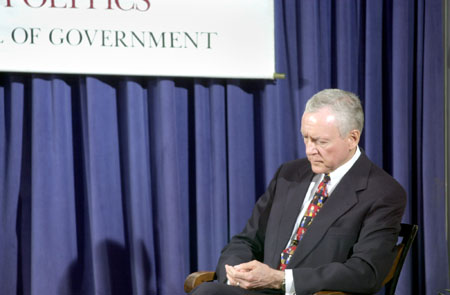Chair of Senate Judiciary Committee says, keep politics out of Court

As chair of the Senate Judiciary Committee, Orrin Hatch yields significant influence over the future direction of the U.S. Supreme Court, but the Utah Republican told a packed audience at the ARCO Forum of Public Affairs at the Kennedy School of Government (KSG) on Monday night that he’s determined to keep politics out of it.
“It is very unwise to view the court as a political body, essentially as another Senate,” he said. “I think it is of paramount importance to view the court in terms of its principled role in our system of checks and balances.”
Hatch spoke eloquently of the need to select judicial nominees based strictly on their legal credentials and not on their ideological viewpoints. In turn, he stated, judges must not use their eminent position to dictate their personal moral code to society.
“Judges are to interpret the laws that are made by those who have been elected by the people. … It’s very important that judges do not go outside the realm of the judicial, that they do not act as super-legislators in black robes from the bench. If they start doing that, the public is going to start losing confidence in the judiciary.”
Public confidence in the judiciary seemed to vacillate during the contentious court battles that followed the presidential election last fall. But in the end, Hatch said, the Supreme Court made the proper ruling in overturning the Florida courts and awarding the election to President Bush.
“It’s the judiciary that has saved the Constitution all these years, not the U.S. Senate nor the House of Representatives,” he told the audience. “We [in Congress] write [legislation] all the time that would undermine the Constitution. It’s the court that has continually saved it.
“The important lesson to come out of [the Bush vs. Gore court case] is that our court did rule and the ruling was accepted. Our country did survive, and we did so without riots in the streets, and it’s an example to the rest of the world what a real representative republic can be.”
No doubt the rest of the world will also be watching if and when President Bush makes his first appointment to the Supreme Court. Two of the court’s oldest justices – Sandra Day O’Connor and John Paul Stevens – are considered a moderate and a liberal, respectively, and many Democrats are concerned their successors could swing the court’s ideological pendulum to the right.
Hatch would not predict which names Bush will float as potential nominees if and when he gets the opportunity, but he did seem to discount one – his own – with one major caveat.
“If I had wanted to serve on the court, I think [President] Reagan would have put me there,” he said. “It’s never been a great desire of mine to serve on the court. However, if you were asked, you’d have to serve.”




